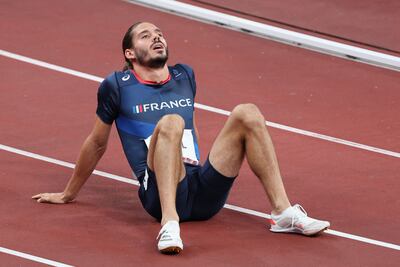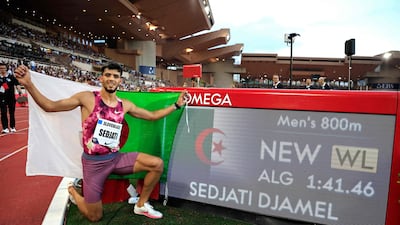Follow the latest news on the 2024 Paris Olympics
Is Paris ready for another nip-and-tuck finish to a high-grade track final, for more of those moments of delicious suspense where commentators pause for photographic confirmation before daring to declare who’s won gold, and the runners themselves peer anxiously at big screens while catching breath?
The Stade de France had one for the thrilling men’s 100m at the weekend. Paris had witnessed something not so different over 800m in the immediate build-up to these Games.
A month back, at the Stade Charlety, the venue nine miles directly south of a Stade de France where the first heats of the men’s 800m take place on Wednesday, several of those with Olympic aspirations in that event were involved in an epic where gold, silver and bronze were separated by no more than five hundredth of a second. That’s a hair’s breadth of a margin for a race over two laps of the circuit. It made for a fabulous appetiser for the contest anticipated for Saturday’s Olympic final.
The collective standard set at the Charlety was almost unprecedented: France’s Gabriel Tual, pushed on by local support, became the fifth fastest man in history over the distance. And he only finished third.
The then teenager Emmanuel Wanyonyi, of Kenya, crossed the line three hundredths of a second ahead of Tual with a time of 1:41.58. And neither could quite catch Algeria’s Djamel Sedjati, who five days later would burnish his new status as the third fastest man of all time over 800m by running even faster, at another Diamond League meeting in Monaco, and establishing himself as the narrow favourite for Olympic gold in a strong, buoyant field of contenders.
Sedjati, from Tiaret, is 25, and if his rise to the category of star-in-the-making has been relatively unheralded until recently, it’s partly because, at his first Olympics three summers ago, his launchpad into elite company malfunctioned, through no fault of his own.
At the Tokyo Games, he had contracted Covid-19 a week ahead of the heats. He was obliged to go into quarantine and watch the 800m go on without him. A rapid rise, in a career that started to take off while Sedjati was doing his military service in Algeria, had been put on hold.
But within a year, he was winning silver at the World Championships, behind the Tokyo Games champion Emmanuel Korir, of Kenya, and giving global notice of his special, startling strength over the last 150m of the event.
The trajectory since has been mostly upward and his 2024 quite breathtaking, the 1.41:46 he posted in Monaco 26 days ago part of gathering momentum that has him aiming for not only the top of the Olympic podium but at becoming the fastest ever over 800m. “I am thinking of the world record,” he said ahead of his arrival in Paris.
That world record belongs to the great Kenyan David Rudisha, who at the London Olympics a dozen Augusts ago, shattered the 1:41 barrier and who, alongside the Kenyan-born Dane Wilson Kipketer, a giant of the sport in the 1990s, is the only athlete to have covered two laps in faster times than those Sedjati has set this year.

Long-time observers of the event sense that, as with Rudisha, an exceptional competitor, namely Sedjati, may now be ushering in a transformative moment in the evolution of the men’s 800m. That London final, in which all but one runner set a personal best time and every athlete’s individual time would have been enough to take gold in the previous Beijing Olympics final, was one such threshold.
The bar being set by the world’s leading half-milers coming into Paris hints at the possibility of something similar this week. It’s a field where the quality runs deep.
Besides Tual, and the partisan backing he is guaranteed from the Stade de France crowd, and the precocious Wanyonyi, who only turned 20 six days ago, there are legitimate podium aspirations from Canada’s powerful Marco Arop, once a junior basketball prospect and the reigning world champion over 800m; from Mohamed Attaoui, of Spain; from other runners from Kenya, as from the US and Britain.
All have played their parts in elevating 800m standards. As the former British Olympic middle-distance star and expert analyst and broadcaster, Steve Cram put it while watching the early summer’s epics in the Diamond League, Sedjati and his rivals are “rewriting how to run it [the 800m]. They’re going out harder, not getting as tired, committing to a really fast first lap and being able to run on with this really fast pace.”
It is Sedjati who pulls this chariot more than anybody. “I’ve worked really hard,” he said, “and I’ve set four world leads this year and two Algerian records.”
His country’s storied past in middle-distance running mean those milestones were already set high. Sedjati’s runs in Paris and Monaco this summer eclipsed the Algerian record set by Taoufik Makhloufi in the first part of his double silver-medal - 800m and 1500m - odyssey at the Rio Games in 2016.
Makhloufi had won gold in London at the 1500m, as did Noureddine Morceli in the same event at Atlanta in 1996; in the women’s 1500m, Algerians Hassiba Boulmerka (Barcelona 1992) and Nouria Mehra-Benida (Sydney 2000) both won Olympic golds.
Mehra-Benida’s husband Ammar coaches Sedjati and he can call on wise advice from various other compatriots on the pressures of huge national expectation and of facing such a broad spread of high-class rivals.
Said Guerni Aissa Djabir, who won bronze for Algeria in the men’s 800m at the Athens Games 20 years ago, advises on the need to “clear away anything that might be a mental block” but is impressed by the “maturity and confidence” he sees in Sedjati - the man with the best momentum of all in an event teed up to be a highlight of the entire Games.


